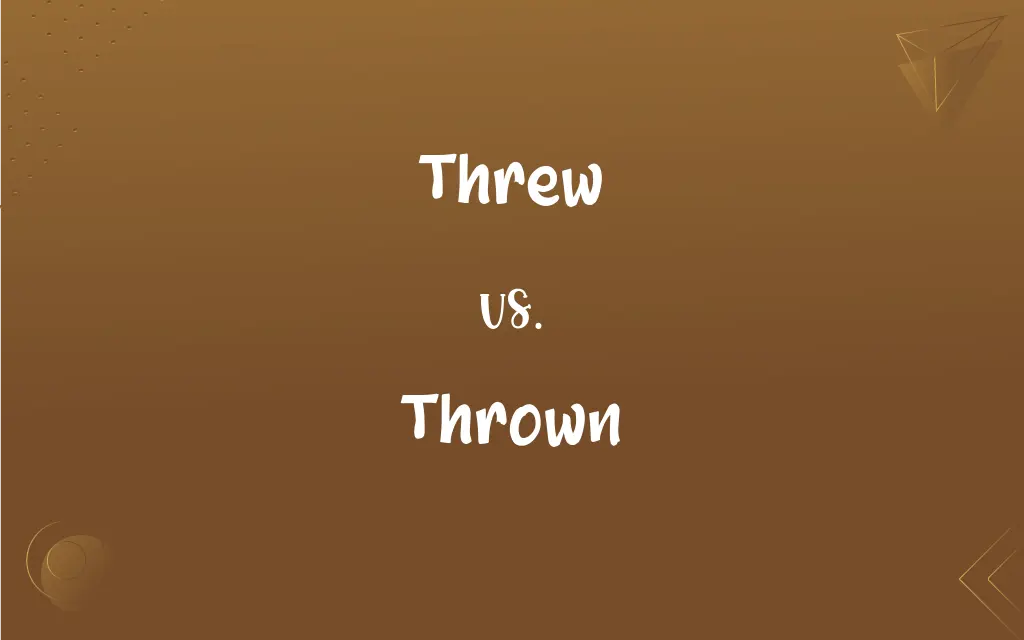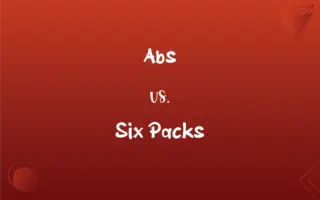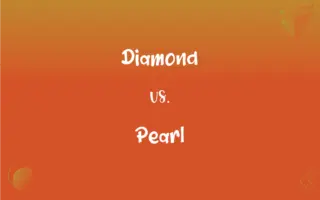Threw vs. Thrown: What's the Difference?
Edited by Harlon Moss || By Janet White || Published on December 10, 2023
"Threw" is the past tense of "throw," indicating an action completed in the past, while "thrown" is the past participle, used with auxiliary verbs to form perfect tenses.

Key Differences
Threw is the simple past tense of the verb throw, indicating an action that was completed in the past. Thrown, as the past participle of throw, is used in perfect tense constructions, requiring an auxiliary verb.
In usage, "threw" stands alone to describe a past action, as in "He threw the ball." Thrown, however, is always used with an auxiliary verb, such as in "The ball has been thrown."
Threw conveys a sense of completed action, without the need for additional context. Thrown, in contrast, often implies an action that has relevance to the present or future.
Threw is never used with auxiliary verbs like "has," "have," or "had." Thrown is always accompanied by these helpers to indicate a specific tense.
The choice between threw and thrown depends on the time frame and context of the action. Threw is definitive and immediate, while thrown is more reflective and often ongoing.
ADVERTISEMENT
Comparison Chart
Verb Tense
Simple Past
Past Participle
Auxiliary Verb Requirement
None
Requires auxiliary verbs (has, have)
Example Usage
"He threw the ball yesterday."
"The ball has been thrown."
Temporal Context
Indicates completed action
Indicates action relevant to present
Function in a Sentence
Can be the main verb
Used as part of a verb phrase
ADVERTISEMENT
Threw and Thrown Definitions
Threw
Used to describe the act of suddenly moving or pushing something.
The magician threw a smoke bomb, disappearing instantly.
Thrown
Often implies an action initiated by someone else.
She was thrown into confusion by the sudden change.
Threw
Indicates a completed action of propelling something through the air.
He threw the frisbee with precision.
Thrown
Past participle of throw.
The ball has been thrown towards the goal.
Threw
Conveys the action of causing something to enter a particular state.
The news threw the community into a state of excitement.
Thrown
Used with an auxiliary verb to form perfect tenses.
The documents had been thrown away before the investigation.
Threw
Implies a quick or forceful action.
In frustration, she threw her book on the table.
Thrown
Indicates an action with ongoing relevance or consequence.
The dice have been thrown, determining our fate.
Threw
Past tense of throw.
She threw the keys to me across the room.
Thrown
Used to describe a state or condition resulting from a previous action.
After the argument, their plans were thrown into disarray.
Threw
Past tense of throw.
Thrown
Past participle of throw.
Threw
Past participle of throw
FAQs
Can 'threw' and 'thrown' be used interchangeably?
No, they are used in different grammatical contexts.
What is the basic meaning of 'threw'?
Threw is the past tense of throw, indicating a completed action.
What does 'thrown' signify?
Thrown is the past participle of throw, used for forming perfect tenses.
Is 'thrown' always used with an auxiliary verb?
Yes, it requires auxiliary verbs like has, have, or had.
How do I use 'threw' in a sentence?
As a simple past tense verb, e.g., "She threw the ball."
What tense does 'thrown' belong to?
It's a past participle used in perfect tenses.
What tense is 'threw' associated with?
The simple past tense.
Is 'thrown' used in idiomatic expressions?
Yes, such as "thrown for a loop."
How is 'thrown' used in a sentence?
With an auxiliary verb, e.g., "The ball has been thrown."
Is 'thrown' used in passive voice constructions?
Yes, it's often used in passive forms.
Can 'threw' stand alone in a sentence?
Yes, it can function as the main verb.
What is a common mistake in using 'threw' and 'thrown'?
Confusing their tense and grammatical structure.
Can 'threw' be used in a future tense context?
No, it's exclusively past tense.
Are there idiomatic uses of 'threw'?
Yes, like "threw a party" or "threw a fit."
Does 'thrown' have different meanings in different contexts?
Yes, its meaning can vary based on the auxiliary verb and context.
Is it correct to say 'has threw'?
No, the correct form is 'has thrown.'
Is 'threw' used in formal writing?
Yes, it's appropriate in both formal and informal contexts.
Can 'thrown' express a state of being?
Yes, especially in passive constructions.
Does 'thrown' imply a current relevance of a past action?
Yes, it often indicates an ongoing impact.
Can 'threw' imply speed or force?
Yes, it often suggests a quick or forceful action.
About Author
Written by
Janet WhiteJanet White has been an esteemed writer and blogger for Difference Wiki. Holding a Master's degree in Science and Medical Journalism from the prestigious Boston University, she has consistently demonstrated her expertise and passion for her field. When she's not immersed in her work, Janet relishes her time exercising, delving into a good book, and cherishing moments with friends and family.
Edited by
Harlon MossHarlon is a seasoned quality moderator and accomplished content writer for Difference Wiki. An alumnus of the prestigious University of California, he earned his degree in Computer Science. Leveraging his academic background, Harlon brings a meticulous and informed perspective to his work, ensuring content accuracy and excellence.

































































